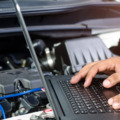Expert Advice That Keeps Your Car Moving
Having car problems? Are you not sure how to fix all the problems you are having? Well, this article is certain to be of assistance. In this article, you will learn some great advice on do-it-yourself auto repair techniques, as well as how to select the right professional for the job.
Make sure there is an emergency kit located in your vehicle at all times. You need tools to change a flat tire, charge a battery, and you must have spare gas. Should your car break down in the dark, it is helpful to have extra batteries, a flashlight, and some blankets.
Check the transmission fluid every two to three months. Let your engine run and open the hood of your car. Use the transmission dipstick to check the fluid levels. If there is not enough fluid in your transmission you probably have a leak somewhere in your system. It is best to take the car to a mechanic so he can locate the leak.
Look for an auto repair shop that displays their certifications for everyone to see. Get a good look at it to make sure that they are current. Even if they are certified, that does not guarantee quality work, but there is a greater chance of the work getting done correctly.
Preventative maintenance is very important if you own a car. Do not hesitate to spend money on the tools you need to inspect and maintain your car or having a mechanic look at your car regularly. Maintaining your car regularly could help you save a lot on repairs or towing if your car breaks down.
If you plan to take your car to the shop, do not leave anything inside the car. Your mechanic may need these parts removed so that they can make repairs. If you discover missing items later, they hold no liability. Remove all items from your trunk too.
If you have never done any auto repair on your own, you should stick with small jobs and do lots of homework to learn how to do larger jobs. Be certain not to start taking your car apart if you aren't sure how to put it back together. Before starting any car repair job, be sure you have all the necessary parts and tools in place and that you know exactly what you need to do to complete the job from start to finish.
Watch for warning signs with a mechanic. There are a few signs to look for when you speak with them about your car. If they try talking really fast about the necessary repairs, can't look you in the eye when talking to you, or try to brush you off, you should find another mechanic. They may be hiding something or they may only care about the money.
Choose a mechanic that is happy to explain the problem to you. Some mechanics feel that they know so much that the customer could never understand, but even if you do not fully understand the problem or what is being done, they should be happy to try their best to inform you about it. It is a huge sign that they are a good mechanic all-around.
Never leave valuables in your vehicle when you bring it to be repaired. It is true that most shops have very trust worthy employees, but not all do, and you do not want to be a victim of theft. Instead, protect yourself by cleaning your vehicle and removing anything that is not attached to the car.
Prior to leaving your car for a diagnosis, ask the repair shop about any fees associated with it. The auto repair shop absolutely has the right to charge a diagnosis fee, in fact it's pretty standard. Though, if it seems out of line with other prices in your area, you may want to go to another shop.
Watch out for the type of shop that will take off your good tires and put old ones on. This is a quick way for them to make a profit and take advantage of you. Mark your tires with some chalks before taking your car to an auto shop. This can help you see if your tires have been properly rotated or switched out for older tires.
Avoid being run over by your own car! When you jack your car up, be sure to set your emergency brake. Place bricks behind the tires you are not working on to keep your car from rolling. Keep a set of wedges or three or four bricks in the trunk of your car in case you have to change a flat tire on a hill.
Don't fix your car as soon as you receive a quote for service. Use this time to call other dealerships and garages to ask for quotes since you can accurately describe the repairs you need. If you get a better quote elsewhere, just pay the mechanic for their time and go with the better offer.
Ask your auto repair shop for a list of fees before you allow any work to be done on your car. Inquire how much any replacement parts will cost and how long the repair is estimated to take so you know how many hours of labor you will be billed for.
Ask your mechanic if he is willing to use re-manufactured or salvaged parts. Using these parts can save you hundreds of dollars and is good for the environment as well. If he is unwilling to use them you may want to find someone else to work on your vehicle, as there really is no reason not to.
Keep your mechanic receipts in a file in your glove box. Organize them chronologically or by kind of repair or maintenance so you can easily find a specific receipt. You just want to make sure you have a full maintenance record for the car so that you can ensure proper repairs and full satisfaction should a dispute arise. This can come in handy later on.
Hopefully, you have learned a lot on how to fix your car problems and how to choose the right professional. Now that you are armed with this advice, you should be able to resolve any problems you are having now and any future ones you may have. Utilize this advice, and enjoy a better car.





